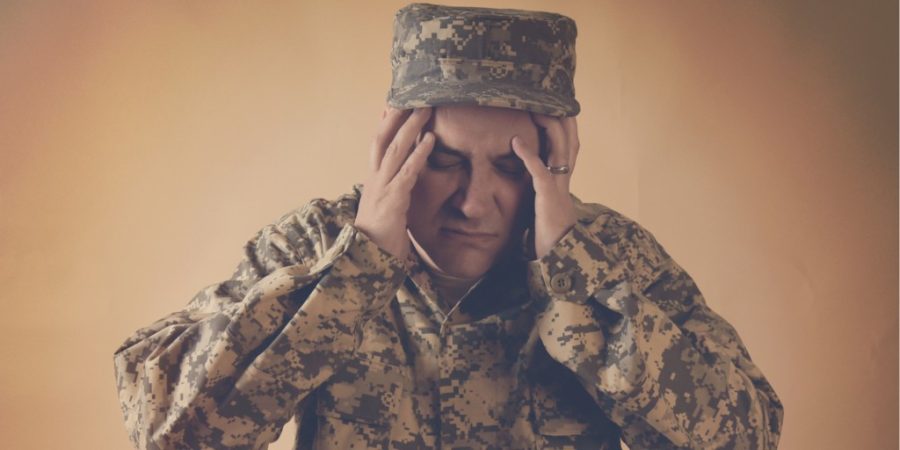
Most people develop habits as a way of dealing with stress. These are called coping mechanisms, and they help individuals get through difficult situations. Unfortunately, many of these habits are negative ones, and simply allow people to avoid the issue at hand. Unhealthy coping mechanisms can have serious consequences on mental health, physical well-being, and your overall outlook on life. This is especially true for our veterans who have experienced post-traumatic stress or other mental health issues as a result of their service.
Unhealthy coping mechanisms are often thought of as a form of addiction. Like the majority of habits, unhealthy coping mechanisms have their addictive qualities. Since unhealthy coping mechanisms are used as distractions, using them can become compulsive. This means that setting them aside can feel almost impossible. This addictive nature is what makes unhealthy coping mechanisms so dangerous.
But what are unhealthy coping mechanisms, and what can you do to avoid them? To better understand this, it’s important to understand what a coping mechanism is in the first place.
Table of Contents
What Are Coping Mechanisms?
Most people who experience stress at some point in their lives feel as though they are unable to cope. Whether those situations of stress involve something serious like the loss of a loved one or trauma from combat exposure, or something simpler like a lost job, they can all trigger people to use unhealthy coping mechanisms to help overcome the feelings and emotions that they are experiencing.
It’s important to remember that some coping strategies are positive. But sadly, it’s easy to fall into the habit of using unhealthy coping mechanisms. This is because coping mechanisms that provide easy, temporary relief from problems are most often ones that involve things like isolation, avoidance, or the use of drugs or alcohol. People turn to these unhealthy coping mechanisms because they produce an immediate effect and reduce stress in the short term.
While it’s clear that some coping mechanisms can be beneficial, how can you tell the difference between healthy and unhealthy ones?
Healthy vs Unhealthy Coping Skills

There are many different kinds of healthy coping mechanisms you can turn to in times of immense stress. Good coping skills are a key part of your overall mental health and can help you successfully navigate challenging times.
Finding a way to work through negative emotions in a healthy, constructive manner is a healthy coping mechanism. For example, some people find things like meditation give them time to refocus, relax, and reflect on the important things in their lives. Others may find activities like exercise or taking up a new hobby to be great ways to cope with stress. Whatever the case may be, practicing good mental health coping strategies is an important part of dealing with stress. But when does a coping mechanism become unhealthy?
Turning to unhealthy coping mechanisms is unfortunately all-too-common when stressful situations arise. Distracting yourself from a stressful situation is a way that helps in the short term. However, avoiding the underlying causes of your stress can lead to serious harm. A coping mechanism becomes unhealthy when it fails to solve the problem in the long term, or when it starts to cause you more harm than good. Unhealthy coping mechanisms can have long-term implications which can have a severe impact on your own life and the life of those around you.
Now that you know what unhealthy coping mechanisms are, it’s time to go over some of the most common used by veterans.
Examples of Unhealthy Coping Mechanisms
The inability to properly deal with stress can lead to feelings of helplessness, powerlessness, and even thoughts of self-harm. Without the ability to properly cope, many veterans will turn to unhealthy coping mechanisms.
There are many common negative coping mechanisms used by veterans. Some of the most common include:
- Isolation: While keeping to yourself during stressful times may seem harmless, the reality is that it can often do more harm than good. Humans need connection, especially with those closest to them. By closing yourself off from others, you take away your most important support networks. Isolation can also increase your risk of mental health issues, such as depression, social anxiety, and low self-esteem. Keep in mind that isolation is also a common symptom of PTSD.
- Projection: Projection is a defensive behavior that is used to shield someone from the stresses they are dealing with. People project by denying characteristics, impulses, or feelings they find threatening in themselves while seeing those same characteristics in someone else. For example, someone may ignore their aggressive impulses by inaccurately believing their friends or family members are being aggressive towards them.
- Denial: The term denial is defined as the selective ignoring of information. When it’s used as an unhealthy coping mechanism, denial is a protective defense against unbearable news or information that can be hard to hear. This is most often used to create a false sense of security that can detach an individual from reality. Someone who is struggling with an alcohol addiction may be in denial by insisting they do not have a problem. Because addiction can be a source of shame, self-hate, and low self-esteem, the first step of most alcohol and drug recovery programs is to admit you have a problem.
- Self-Medication: Turning to drugs or alcohol is a common unhealthy coping mechanism, especially for veterans. Nearly one in ten veterans have been diagnosed with a substance use disorder, which is higher than the general population. Self-medicating is a defensive strategy used to avoid feelings of helplessness or powerlessness. Using drugs or alcohol may help to numb feelings, pain, and those negative thoughts that are actively being avoided, but excessive use can lead to severe health complications, addiction, overdose, and death.
Coping With Stress the Right Way at Heroes’ Mile in DeLand, Florida

If you or someone you know is struggling with unhealthy coping mechanisms like drug or alcohol abuse, the time to get help is now. At Heroes’ Mile, located in DeLand, Florida, we specialize in providing veterans with the care they deserve, administered by other veterans who know exactly where they’ve been and what they’re going through.
We understand that the stresses that veterans face are unique, and that to have the best chances at recovery, veterans need a place where they can feel comfortable and understood. That’s why at Heroes’ Mile we make sure that our programs and services are specifically designed for veterans by veterans.
Too often, unhealthy coping mechanisms lead to the development of a substance use disorder. At our treatment center, we offer several programs designed to help teach veterans healthy ways to cope with stress, while solving the underlying causes. Some of our treatment options include:
- Veteran-focused individual therapy
- Group therapy
- Art therapy
- Eye movement desensitization and reprocessing (EMDR) therapy
- Counseling services for family members
- Cognitive behavioral therapy (CBT)
If you’d like more information about unhealthy coping mechanisms, or if you have any questions about our treatment options, give our admissions staff a call today at 888-838-6692. You can also contact us online using our confidential contact form. Whichever method you choose, Heroes’ Mile in DeLand, Florida is ready to help.
The post Spotting Unhealthy Coping Mechanisms in Veterans appeared first on Heroes’ Mile Veterans Recovery Center.
Source
Original Author: Heroes’ Mile

